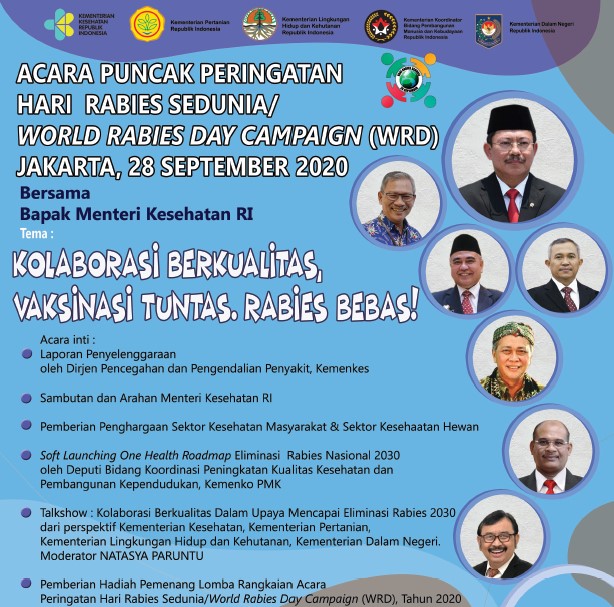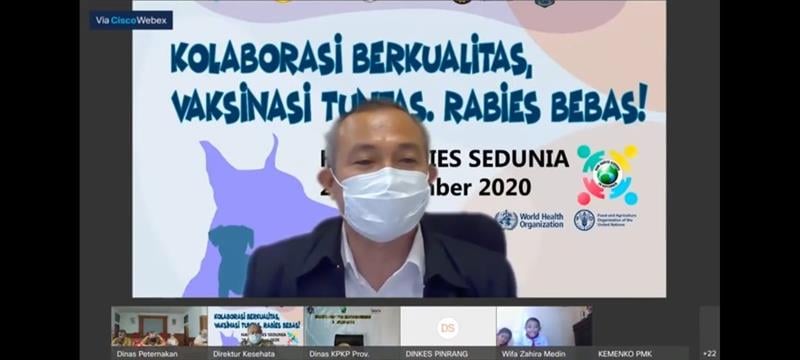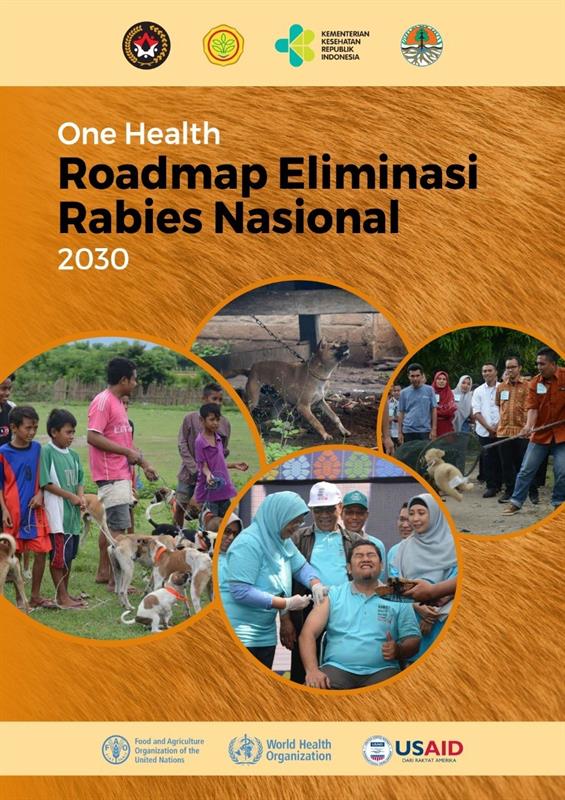Every year, dog-mediated rabies kills at least 59 000 people in over 150 countries across the world. Rabies is endemic in eight of the 11 countries in the South-East Asia region, with more than 1.5 billion people region-wide at risk of rabies exposure and 26 000 people succumbing to the disease annually: accounting for around 45% of the global burden.
In Indonesia, only eight provinces are rabies free (Riau, Bangka Belitung, DKI Jakarta, Central Java, DI Yogyakarta, East Java, Papua and West Papua). The disease is endemic in the remaining 26 provinces and over the past five years, Indonesia experienced an average of 80 861 rabid animal bite cases and 105 deaths per year. In 2019, this increased to a reported total of 100 826 cases of rabid animal bites, while in 2020 (up to August), only 24 745 rabid animal bites cases have been reported.
This year, the commemoration of World Rabies Day on 28th September was organized by the Indonesian Ministry of Health (MoH) in collaboration with the Ministry of Agriculture (MoA), Ministry of Forestry and Coordinating Ministry of Human Development and Culture. The commemoration activities were supported by both WHO and FAO under the 2020 global theme of ‘End rabies: collaborate and vaccinate’.
Minister of Health opened the World Rabies Day on 28 September 2020. Ministry of Agriculture, Ministry of Environmental and Forestry, Ministry of Internal Affairs, Coordinating Ministry of Human Development and Culture joined forces for rabies prevention and control. Poster credit: Ministry of Health, Indonesia
Activities were designed to support advocacy for multisectoral united efforts towards ending human deaths from dog-mediated rabies by 2030. The activities included a photography and video competition and testimonies from the field. MoH and MoA also held webinars on collaboration for rabies control in Indonesia and hosted a talk show that focused on the current national situation as well as efforts and collaboration in rabies prevention and control. An additional webinar was held for school-aged children to build awareness of rabies prevention behaviours.
The online events emphasized that to make rabies elimination in Indonesia a reality by 2030, it is vital that all sectors join forces – government, animal and human health, researchers, private sector, civil society and community.
Utilising the global strategic plan to end human deaths from dog-mediated rabies by 2030 and regional strategic framework for elimination of human rabies transmitted by dogs, WHO and FAO supported Indonesia to develop a national road map for rabies elimination by 2030, launched on World Rabies Day.
Caption: Mr. Agus Suprapto, Health Quality Improvement and Population Development Coordinating Deputy, Coordinating Ministry of Human Development and Culture, launched the national road map for rabies elimination by 2030 during the commemoration of World Rabies Day on 28 September 2020. Credit: Endang Wulandari/ WHO
The national road map for rabies elimination by 2030 highlighted several key strategies for rabies control:
- Rabies control in animals through vaccination, dog population management;
- Rabies prevention in humans through rabid animal bite case management, provision of anti-rabies vaccine, strengthening rabies centres, and building capacity of heath care workers;
- Strengthening surveillance in humans and animals using one health approach;
- Raising awareness through advocacy, communication and community empowerment;
- Strengthening policy and legislation;
- Operational research;
- Collaboration with partners for optimal resource mobilization.

Caption: Cover of the National Roadmap for Rabies Elimination by 2030 released during World Rabies Day, 28 September 2020. Credit: Ministry of Health, Ministry of Agriculture, WHO, FAO and USAID.
Over the years, WHO and FAO have supported the Government of Indonesia to develop rabies training modules and implement training workshops for health care workers using the one health approach. Work has also been conducted to strengthen rabies centres, provide anti-rabies serum (SAR) and anti-rabies vaccine (VAR) to communities and to create education, information and communication (EIC) materials for rabies control. As partners to the government, the agencies have continued to build surveillance capacity for outbreak field investigations for outbreak-prone diseases, including rabies, and in 2019, a Joint Risk Assessment (JRA) for rabies was conducted in West and East Nusa Tenggara as part of the outbreak response in the area to develop tailored operational plans for rabies control.
However, more is needed to effectively reduce the instances of rabies infection and death in Indonesia. Through this World Rabies Day, WHO and FAO continue to encourage collaboration between sectors, partners and the community to jointly implement the new national road map for rabies elimination by 2030.
Main image caption: A dog is vaccinated against rabies in Indonesia. Credit: Jefta Images/Barcroft Media via Getty Images
